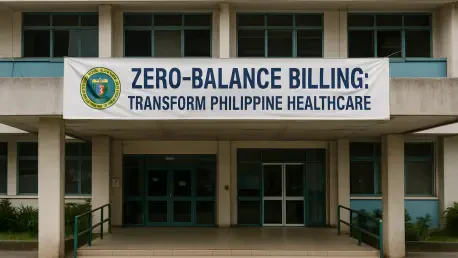Imagine a scenario where a family in a rural Philippine province faces a medical emergency, yet the fear of crippling hospital bills no longer looms over their heads, thanks to a groundbreaking initiative. This vision is at the heart of the Philippine government’s ambitious zero-balance billing program, designed to eliminate out-of-pocket expenses for patients in public hospital wards. Under this policy, costs for essential services such as room and board, medicines, laboratory tests, and professional fees are fully covered by the Philippine Health Insurance Corp. (PhilHealth). The program represents a significant step toward accessible healthcare, aiming to alleviate the financial burdens that often deter individuals from seeking necessary treatment. As discussions unfold within government circles, the focus remains on whether this initiative can sustainably reshape the healthcare landscape, ensuring that no patient is left behind due to economic constraints. The stakes are high, and the potential impact on millions of lives is profound, making this a pivotal moment for the nation’s health system.
Financial Backbone of a Bold Vision
Sustaining a program as expansive as zero-balance billing requires substantial financial commitment, and the Philippine government is stepping up to the challenge with significant budget allocations. Budget Secretary Amenah F. Pangandaman has disclosed that an estimated P20 billion is necessary to keep the initiative running, though this figure is preliminary and awaits final confirmation from Health Secretary Teodoro J. Herbosa. This funding has been integrated into the proposed 2026 National Expenditure Program for the Department of Health (DoH), which sees a remarkable 29% increase to P320.5 billion. Additionally, PhilHealth is set to receive P53.3 billion to bolster the program. Resources are drawn from diverse sources, including the DoH’s medical assistance program for indigent patients, contributions from the Philippine Charity Sweepstakes Office, and funds from the Philippine Amusement and Gaming Corp. Despite this robust financial framework, questions linger about whether these allocations will fully meet the program’s needs, highlighting the delicate balance between ambition and fiscal reality.
Navigating Implementation Challenges
While the financial commitments are impressive, the road to fully implementing zero-balance billing across 87 DoH hospitals nationwide is fraught with operational and logistical hurdles. During a recent budget hearing, Senator Paolo Benigno “Bam” Aquino IV raised concerns about the sufficiency of the current allocations to achieve comprehensive coverage. In response, Secretary Pangandaman expressed cautious optimism, noting that the ultimate goal is full implementation, though exact outcomes remain uncertain as the program is still in its early stages. The scope of the initiative is extensive, encompassing not only existing facilities but also those under development and hospitals managed by government-owned corporations. As regional state hospitals expand operations and PhilHealth maintains a significant subsidy, the collaborative efforts between the Department of Budget and Management and DoH are critical. The lingering uncertainty around final cost computations underscores the need for meticulous planning to ensure that this transformative healthcare model achieves its intended impact.









